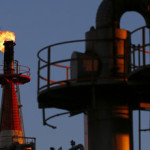Cooperation holds the key to oil’s future

OPEC Bulletin Commentary July-August 2015
International crude oil prices in July suffered their largest monthly decline since Lehman Brothers collapsed in the United States in 2008, marking the onset of the global financial crisis. Today’s continuing pressure on prices, brought about by higher crude production, coupled with market speculation, remains a cause for concern for OPEC and its Members — indeed for all stakeholders in the industry.
Apart from the obvious loss of much-needed revenue required for Member Countries’ socio-economic development, there are growing fears that, under the current low-price scenario, investment in future capacity additions will continue to be shelved or cancelled altogether.
With the long lead times associated with bringing new oil to market, the industry cannot afford a lapse in spending, particularly in view of the long-term expectations for oil demand, which point strongly to a considerable rise in world oil consumption over the next two decades at least.
Failure to invest now could mean prices in the coming years spiking to levels inconsistent with what is considered ‘reasonable’ for both producers and consumers.
On the other hand, it is perhaps too much to expect oil companies to risk significant spending in the current economic climate. They already have enough on their plate in having to retrench and find ways of reducing costs in their existing projects, matching operational budgets to today’s low prices.
The one good thing to come out of a period of lower prices is that demand customarily rises as cheaper fuel encourages more usage by the consumers. And the current situation appears to be no exception. In fact, three of the industry’s main authoritative institutions — OPEC, the International Energy Agency (IEA) in Paris and the Energy Information Administration (EIA) of the United States — all forecast oil demand improving going into next year. Their forecasts show that this will occur on the back of an expected increase in global economic growth, which, in turn, should also help crude prices to strengthen.
OPEC’s Monthly Oil Market Report (MOMR) for August points out that given the better-than-expected growth in global oil demand so far in 2015, together with signs of a pick-up in the economies of the major consuming countries, crude oil demand in the coming months should continue to improve.
It adds that this development would also serve to gradually reduce the imbalance in oil supply and demand fundamentals.
The OPEC Secretariat’s projections are pinned to the fact that global economic growth will rise by 3.2 per cent this year, with an even better performance of 3.5 per cent slated for 2016.
Of significance is the fact that the OECD and Euro-zone regions, which previously suffered years of stagnation, are set to expand next year — by 2.1 per cent and 1.3 per cent, respectively.
Add to the equation the fact that India will see its gross domestic product improve to 7.7 per cent in 2016, China will still be relatively strong at 6.5 per cent, while Russia and Brazil are seen moving out of recession, and one can appreciate why there is growing optimism over oil demand growth improving.
Boosted by the OECD Americas and Europe, OPEC figures show that world oil demand this year is now expected to rise by 1.38 million barrels/day from its 2014 level to 92.70m b/d, while in 2016 it is expected to add another 1.34m b/d to growth.
This all augurs well for oil prices and should play a big role in helping to restore market stability.
History has repeatedly taught us that when dealing with something as complex and intricate as the international oil market, which involves many vested interests looking to defend their respective positions, it is rarely going to be plain sailing.
But if the wide-ranging projections on oil demand are correct, then it is just a case of riding out the storm and waiting for calmer waters to return.
Needless to say, OPEC, as always, will continue to do all in its power to create the right enabling environment for the oil market to achieve equilibrium with fair and reasonable prices.
As the Organization has stressed on numerous occasions, it stands ready to talk to all other producers. But this has to be on a level playing field. OPEC will protect its own interests. As developing countries, its Members, whose economies rely heavily on this one precious resource, can ill afford to do otherwise.
Cooperation is and will always remain the key to oil’s future and that is why dialogue among the main stakeholders is so important going forward.
There is no quick fix, but if there is a willingness to face the oil industry’s challenges together, then the prospects for the future have to be a lot better than what everyone involved in the industry has been experiencing over the past nine months or so. Only time will tell.
Source: OPEC





























